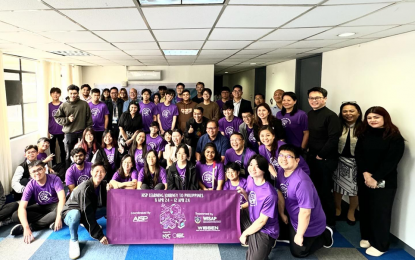
LEARNING JOURNEY. Singaporean students with government officials from the Cybercrime Investigation and Coordinating Center (CICC) and private partners from the Association of Information Security Professionals Singapore (AiSP) and the Women in Security Alliance Philippines (WiSAP) during the CICC-AiSP-WiSAP forum on Wednesday (April 10, 2024). CICC Executive Director Alexander Ramos expressed confidence that the two countries' bilateral partnership on cybersecurity will become stronger through the forum. (Photo courtesy of CICC)
MANILA – The Cybercrime Investigation and Coordinating Center (CICC) and Singapore have strengthened bilateral ties on cybersecurity at a forum held between students and government officials at the National Cybercrime Hub (NCH) in Bonifacio Global City on Wednesday.
In a statement on Friday, CICC Executive Director Alexander Ramos said the CICC-Association of Information Security Professionals Singapore (AiSP)-Women in Security Alliance Philippines (WiSAP) forum was organized to celebrate the collaboration between the two countries that began in 1969.
The Association of Southeast Asian Nations (ASEAN), Ramos said, is now a center of technological development and expressed optimism that both the Philippines and Singapore –both founders of ASEAN– will continue to cooperate in the field of cybersecurity.
He highlighted the establishment of the NCH in December 2022 and its role as a center for collaboration between the government, private sector, and the academe as part of the country’s efforts to eliminate bureaucracy in its fight against cybercriminals.
“We don’t tolerate delay with communication. We don’t deal with long queues with zero bureaucracy. Zero bureaucracy is a tool to fight cybercrime because every minute counts,” he said.
During the forum, WiSAP chair and president Mel Migrino said that among the 11 countries surveyed in Asia, Filipinos are least likely to report to authorities when they are victims of cybercrime, with only 24.6 percent of Filipino victims of scams filing a report with the authorities due to a low rate of recovery.
On the other hand, Singapore was among the highest at reporting cyber crimes at 51.5 percent, followed by China at 55 percent.
The forum was co-organized by WiSAP and was attended by students and lecturers from Singapore’s Nanyang Polytechnics, Institute of Higher Learning College East, and the AiSP. (PNA)
